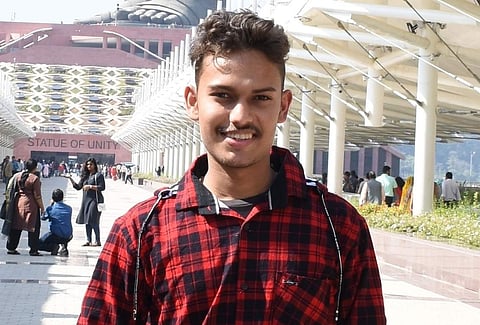

How often is it that we crave a mobile app that can convert mundane and long texts into easily understandable audiobooks? Well, now you can just DocTune it! The application turns PDF and even handwritten documents into audio files in six Indian languages. We caught up with its 20-year-old founder, Dewang Bharadwaj, a third-year electronics and communication engineering student at Jaipur Engineering College and Research Campus (JECRC) to know more about the inspiration behind the development. Excerpts from an engaging conversation:
So how did you happen to come across the idea for DocTunes? Take me through the initial days of your start-up.
During the pandemic, our entire college curriculum had moved to the online mode of delivery. We did not have our engineering books with us a lot of the time. So we would be sent PDF and handwritten documents by our teachers. I found that reading from the documents was often a burden. So I searched for an application that could turn documents into audiobooks into a native language because understanding English was also an issue sometimes. I did not find any app. I mentioned this to my friend, Kunal Singh Shekhawat, who is now a Co-founder of our app. When we discussed the idea with our friends, they also thought that it was indeed a gap worth addressing. So that's how DocTunes happened.
What can you tell us about the developmental phase of DocTunes?
During the second year of our academic programme, we learnt a lot about coding. Kunal and I had a common interest in developing machine learning models. We had learnt Python and Java so we knew how to build an application. One thing that we did not know at the beginning was about Application Programming Interfaces (API). The task at hand was that we had to interlink three APIs. So we went through a lot of YouTube videos and learnt how to do it. That is how the application took shape.
What are the features that you have now incorporated into the app?
Right now, we are almost done with a new update to our application in which we have built a very simple but engaging user interface. Our unique selling proposition is that we can convert a document's text into an audiobook that is in your native language. Not just that, you can even control the pitch and pace of the audiobook along with the choice of a female or male reading voice. We have trained the machine learning algorithm with a lot of data so that it can translate the text in a meaningful way. The accuracy of the translation is not perfect yet but we are working to make it better with each day. Currently, for handwritten documents the accuracy is somewhere between 88 and 92 per cent. But for PDF documents, the accuracy is much higher at 98.86 per cent. We currently provide audiobook translation in 32 languages, of which 6 are Indian. They are Tamil, Telugu, Kannada, Bengali, Gujarati and Hindi.
What were some of the setbacks that you had to face while developing the app?
There was a lot of work to be done on the development side. We learnt 5 languages for this which were Java, HTML, CSS, Python and Flutter. For the business development side of the start-up, our institute JECRC helped a lot. They helped with the industry connections and mentors so that we could learn from their mistakes and implement their recommendations. I am extremely thankful for the support extended by the director of our institute, Arpit Agarwal.
So what are some additional things that you would look to incorporate into the app?
Our main target right now is to improve the translation itself. If a translation provides the wrong output with respect to a word, then it is of no use. It would then be misinformation. Another thing that we are working towards is to incorporate the user's own voice as the audiobook's speech. This would allow users to listen to their own voice while listening to the audiobook. The app is currently available only on the Android Play Store but we expect to add a version on the iOS App Store as well by Christmas this year.
